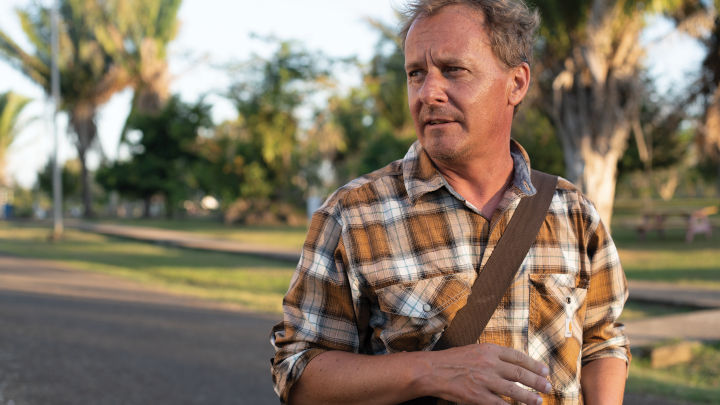Give and not Take
SDSU education doctoral student Al Schleicher wasn’t in Belize with his hand out. The Fulbright Scholar was all in for a collaborative experience that would create lasting effects on the country’s educational endeavors.
By Michael Klitzing
This story was published in the Summer 2023 Issue of SDSU Magazine.

If you’re looking to find most Americans in Belize, you needn’t look further than the tourist haunts well-documented by guidebooks and blogs.
There are Mayan wonders near the Guatemalan border. There are famous Caribbean hot spots like Caye Caulker and San Pedro.
If you were looking to find San Diego State University Fulbright Scholar Al Schleicher in Belize in the spring, however, you would have needed to stray from the Gringo Trail that crosses through much of Latin America.
From the airport near Belize City, $100 gets you a trusted expert to navigate 80 kilometers of rural highway dotted with lush palms, fresh coconut stands and tapir crossings. You would have soon found yourself on the balcony of Schleicher’s comfortable two-bedroom apartment in the capital city of Belmopan, sharing a Belikin beer.
A few things to know about Belmopan before we continue.
First, the scorching 95-degree temperature on this day in late March? Completely normal.
Second, with a population of about 20,000, it’s the smallest seat of power in the Americas. It has one stoplight, a few restaurants clustered around the bus depot and some pleasant, brightly colored residential neighborhoods. It’s also home to the University of Belize, the country’s premier institution of higher education and Schleicher’s workplace from January until May. And like every other Belizean city, the official language is English.
Schleicher, a student in SDSU’s Joint Ph.D. Program in Education with Claremont Graduate University, feels right at home.
“When’s the last time you walked down the street and a stranger said, ‘Good morning’? Everyone says good morning here,” Schleicher says. “People are friendly — and it’s genuine.”
As he wrapped up his work as a Fulbright Scholar — a U.S. Department of State program that sends U.S. academics abroad to teach, conduct research and carry out professional projects — Schleicher was out to return the hospitality in kind.
SDSU IS NO STRANGER to Fulbright success. The university has been named a Fulbright Hispanic-Serving Institution Leader by the U.S. Department of State for its success sending students abroad on the Fulbright U.S. Student Program.
However the Scholars program, which is more faculty focused, has been — to this point — a much rarer animal.
“SDSU is committed to promoting internationalization throughout every aspect of the academic experience,” says Cristina Alfaro, SDSU associate vice president for International Affairs. “Encouraging our faculty to pursue Fulbright Scholar opportunities is crucial in developing international diplomacy and relationships that will ultimately benefit our students, and we intend to develop this area through our university’s global strategy.”
Schleicher — a former classroom English teacher in Los Angeles who received his undergraduate degree from SDSU in 1997 — was drawn to Belize when he learned about its low rate of literacy. But he was intent on not taking what he’s dubbed “the Indiana Jones approach” to his Fulbright project.
“Indiana Jones was a professor who traveled the world taking stuff that didn’t belong to him,” Schleicher says. “I’m not here to collect data on your K-12 kids and take it back to the United States to publish. Now, if you want to work on a research project together? Let’s do that.”
AROUND UB’s TIDY Belmopan campus — marked by towering palms, lounging iguanas and purple- and gold-painted buildings on stilts — Schleicher was dubbed “Professor Al” by his new boss, Dean Thisbe Lucas-Usher.
Schleicher’s original Fulbright proposal was to build professional learning communities for Belizean in-service teachers as a way of impacting the country’s low literacy rate. However conditions on the ground quickly made clear that would not be realistic.
Schleicher had to pivot. He quickly developed a nuanced understanding of the local education challenges, primarily what he sees as a mismatch between the student population, which primarily speaks Creole, and the English-only instruction offered by the schools. Another factor was that an associate’s degree is the only requirement to teach; UB’s programs, however, offer bachelor’s degrees in education.
Throughout his project, he focused on supporting the university’s Education and Arts faculty as they grew their education research enterprise.
“Professor Al has been a blessing to our faculty — he’s one of us,” Lucas-Usher says. “As soon as he arrived, he told us that he’s willing to lecture, that he’s willing to give presentations in our classrooms and that he’s willing to engage in research with our faculty. His knowledge and experience have benefited us greatly.”
Schleicher taught two classes, one in English and another in research methods in education. He also assisted a group of 15 faculty members as they worked to launch a research office, even authoring integral proposals.
He also found other ways to help, from procuring dozens of hard-to-find books for the college’s fledgling education research library, to getting UB’s early childhood laboratory school ready to reopen for the first time since the pandemic.
In addition to his research expertise, Professor Al wielded a mop and a paint roller like no other.
“One of the things that’s great about the Fulbright is that you learn a lot about yourself,” Schleicher says, polishing off the last of his Belikin. “What I’ve learned is that if a group of people or an individual is receptive to your collaboration, magic can happen.”
